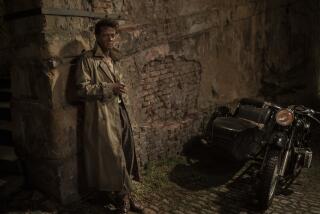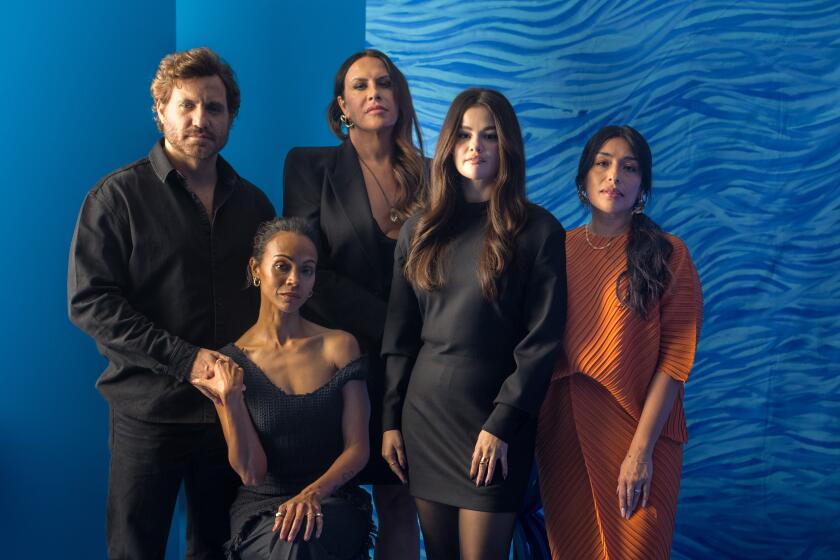Review: The Catholic Church abuse scandal hits France in ‘By the Grace of God,’ and the powerful drama will make you furious
One of the major themes of “By the Grace of God,” a brilliantly nuanced, coolly devastating account of a pedophilia scandal in the Roman Catholic Archdiocese of Lyon, France, is the difficulty of getting even like-minded people to agree on tactics. In one scene, a sexual-abuse survivor, Alexandre (Melvil Poupaud), suggests to another, François (Denis Ménochet), that he revise a statement that will be presented to the media. “You need to be more neutral and factual,” Alexandre says. “Take out the poetry and the anger.”
Watching this sprawling but fine-tuned drama, you may at first wonder if writer-director François Ozon took at least some of Alexandre’s advice. Audiences who know Ozon from “Swimming Pool,” “Double Lover” and other thrillers of sly erotic mischief may be surprised to find him venturing for the first time into true-story territory, and doing so with unusual emotional and stylistic restraint. In lieu of poetry, he has composed an exemplary piece of prose: clear, direct and quietly illuminating. At the same time, you would hardly describe this movie as neutral or devoid of anger. On the contrary, its moral outrage is all the more pronounced for being so controlled.
The protagonists are based on the real-life men who came forward to accuse a priest, Bernard Preynat, of molesting them when they were children in the 1970s, ’80s and early ’90s. Even compared with “The Boys of St. Vincent,” “Spotlight” and other indelible fact-based dramas about the sexual abuse scandals that have engulfed the Catholic Church over the past few decades, “By the Grace of God” has a particular ripped-from-the-headlines urgency. Earlier this year, Preynat unsuccessfully sued to block the movie’s release, claiming it would impact his forthcoming trial. An ecclesiastical court found him guilty of sexual abuse and defrocked him in July, one of numerous legal developments that have made the case a landmark one in France.
Alexandre is one of three survivors who form the picture’s dramatic core, and it is his decision to speak out that encourages others to do the same. When we first meet him in 2015, however, he has no intention of starting a movement. Years after being abused by Preynat (Bernard Verley), the chaplain of his Boy Scouts troupe in the town of Sainte-Foy-lès-Lyon, Alexandre remains a devoted Catholic and, along with his wife (Aurélia Petit), has raised their five children in the church. When he seeks a meeting with Cardinal Philippe Barbarin (François Marthouret), the archbishop of Lyon, he mainly wants assurances that Preynat, who is still active in the parish, will be kept away from children.
The taut opening stretch of “By the Grace of God” plays like an epistolary procedural, rushing along on a solemn stream of emails exchanged by Alexandre, Barbarin and a church counselor (Martine Erhel) as they discuss what is to be done. It soon becomes clear that only Alexandre thinks there is anything to be done at all. Despite a reputation for progressiveness and transparency, Barbarin is hesitant to discipline Preynat, much less turn him over to the police. He seems most concerned about the priest’s guilty conscience, and even arranges for Alexandre to meet with and forgive his self-confessed abuser, in hopes that he will be sufficiently moved to drop the matter and quietly move on.
But Alexandre is infuriated, and you are likely to share his fury. In the face of so much well-intended uselessness — so many clucked tongues, assurances of action and offers of prayer — you understand how a culture that prides itself on civility and decorum will often use those very ideals to deflect and diminish the experiences of the abused. (The cardinal seems more offended by the word “pedophilia” than he is by the presence of an actual pedophile among his clergy.) Similarly, an institution that places its highest value on the condition of a perpetrator’s soul can, without too much strain, come to see that soul as above the law.
In time the story’s perspective shifts, and the scope of the movie both broadens and deepens. Alexandre was far from the only Boy Scout who passed under Preynat’s supervision, and his testimony gradually spurs others to come forward with their own. (The real-life Preynat stands accused of molesting more than 80 boys; in most of the cases, however, the 20-year statute of limitations has expired.) Among the most outspoken is François, who forms a victims’ support group and whose heated, passionate advocacy forms a productive contrast with Alexandre’s more businesslike reserve. Another who joins the cause is Emmanuel (Swann Arlaud), who wears his scars more visibly than the others, struggling to find steady work and often experiencing seizures in response to remembered trauma.
The stories of these three very different men remind us that, while an offender’s crimes may amount to a collective horror, the scars they inflict are always devastatingly unique to the individual. Watching them go about their lives, dealing with their trauma while also trying to put it behind them, you can’t help but take stock of their similarities and differences. François and Emmanuel are atheists, while Alexandre retains his faith. Alexandre and François have the support of their wives and children; Emmanuel has an unstable, sometimes violent relationship with his girlfriend. All have family members who aid in their healing and outreach — and also family members who accuse them of sabotaging the church for the sake of a victim complex.
Ozon subtly draws our attention to these parallels and contrasts, particularly with regard to class; a construction worker decides not to go public with his accusations, noting with some bitterness that a white-collar type like Alexandre will have an easier time of it. But the director and his superbly attuned actors resist the notion that any of this is easy, and they refuse to impose a thesis or a schematic pattern of behavior on their characters. There is something not just convincing or persuasive but irreducibly honest about the complexity of experience we see here. There is no single right way for a survivor to move forward, and no wrong way either.
“By the Grace of God” is an exceptional process movie — patient, lucid, generously human. It’s economical, but not reductive. At times it recalls the recent “BPM (Beats Per Minute)” in its moment-by-moment depiction of community activism in progress, as well as in its sincere (and deeply French) belief that debate and dialectics can spur meaningful change. The closing text informs us of some of the significant legal reforms that have swept through France in response to the Preynat case, including Barbarin’s removal from leadership for his role in the cover-up. But there is nothing triumphant about these revelations, and the story doesn’t ultimately hinge on them.
Occasionally we see piercing, discreetly shot flashbacks to the men’s terrible boyhood encounters with Preynat. The point of these brief allusions is not to depict, much less exploit, the trauma of abuse, but rather to remind us that for these men, there is no real escape from it. “By the Grace of God” understands that the pain is always there, which is not to say that it’s everything. The business of life, of healing and renewal, forges ahead in the present tense — which is another way of saying that it is never truly finished.
‘By the Grace of God’
In French with English subtitles.
Not rated.
Running time: 2 hours, 17 minutes
Playing: Landmark Nuart Theatre, West Los Angeles
More to Read
Only good movies
Get the Indie Focus newsletter, Mark Olsen's weekly guide to the world of cinema.
You may occasionally receive promotional content from the Los Angeles Times.











